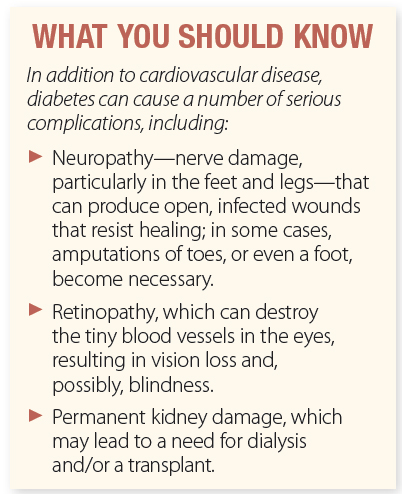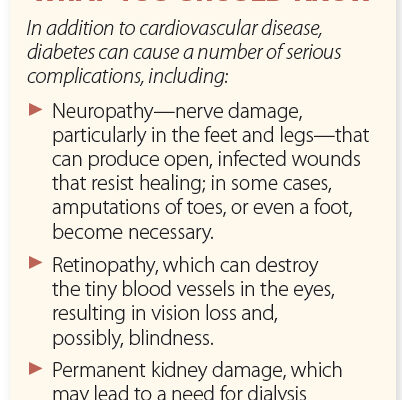Cut Your Diabetes and Heart Disease Risks By Losing Weight
Being overweight or obese means you’re more likely to have a long list of health problems, and diabetes is at the top of that list: Among adults diagnosed with diabetes, 89 percent are overweight.
“When people have excess fat tissue in their bodies, carbohydrates of all types (simple sugars, as well as more complex starches) are not metabolized normally, which causes a rise in blood glucose (sugar) levels. Excess fat also releases hormones that can increase the risk of diabetes,” explains Rekha Kumar, MD, an assistant professor of medicine at Weill Cornell Medicine. “There is also a genetic component: A genetic predisposition makes some people more prone than others to develop diabetes when they gain weight.”
The Diabetes Dilemma
It’s estimated that more than one quarter of U.S. adults who have type 2 diabetes don’t even know they have it, since it often causes no symptoms until the disease has progressed for many years, or even decades. However, diabetes is doing systemic damage throughout the body, even when no outward signs of the disease are present.
Even when symptoms such as excessive thirst and increased urination do appear, they usually happen gradually and can go unnoticed. And since early symptoms typically don’t include pain or any significant functional impairment, many people just do not realize the harm that is being done.
Diabetes and Cardiovascular Disease
“One reason we are so concerned about diabetes is that it is equivalent to coronary artery disease when predicting future cardiovascular risk; that is, one’s risk of having a heart attack is as high in someone with diabetes as it is in someone who has already had a heart attack,” explains Dr. Kumar. “Our goal in preventing and treating diabetes is to reduce vascular damage that raises the risk of cardiovascular events, including stroke, heart attack, and cardiac death.”
Good control of blood glucose levels also can help prevent complications that are caused by microvascular disease in the body’s smaller blood vessels, such as impaired vision, nerve damage, and kidney disease.

Obesity Is Modifiable
Although diabetes can do a lot of damage, it’s also important to focus on the good news, which is that obesity is modifiable (unlike age, family history, and genetic makeup, which are unmodifiable risk factors). This means you can take action to improve your health.
“It is clear that being overweight or obese is a major risk factor for type 2 diabetes. However, it is also clear that achieving and maintaining a healthy body weight and body fat mass greatly reduce the risk of diabetes, and may even reverse its course,” says Dr. Kumar.
Options for Weight Loss
If you’re obese or overweight, you know that losing weight can be difficult. Many types of weight-loss plans can be effective. For the best chance of success, you’ll need to get some information so you choose a plan that is well suited to your preferences and lifestyle.
Many people enjoy the convenience of weight-loss programs that can be accessed online or via an app.
“For example, Noom is a behavioral support app that can help with diabetes and weight loss. Noom meets the CDC’s Diabetes Prevention Program standards, which can be used for managing diabetes. And there are several other options as well,” notes Dr. Kumar.
By visiting the American Diabetes Association’s website (www.diabetes.org), you can access many resources that provide information, recipes, and tools to make grocery shopping and meal planning easier. These resources can help people with diabetes get and keep their blood glucose levels under control, as well as assisting with weight loss for those who need it.
Get Help from an Expert
“If you need guidance and support to achieve your weight-loss goals, I advise working with a registered dietitian who is a certified diabetes educator (CDE),” says Dr. Kumar. A CDE can help you determine which weight-loss plan is best for you and help you set and achieve your goals.
In a nutshell, losing weight will reduce your diabetes risk (or help you manage the condition if you already have it) while providing protection to your heart.
The post Cut Your Diabetes and Heart Disease Risks By Losing Weight appeared first on University Health News.
Read Original Article: Cut Your Diabetes and Heart Disease Risks By Losing Weight »


